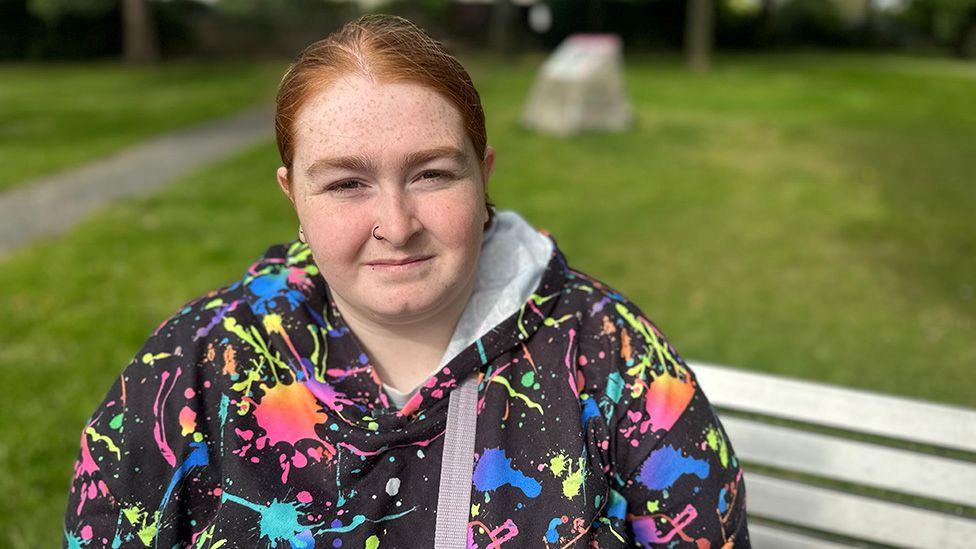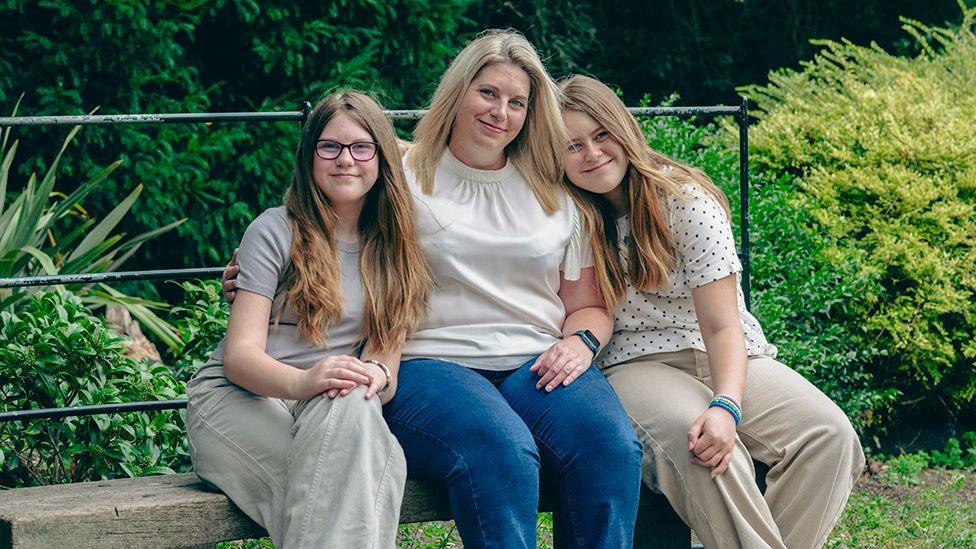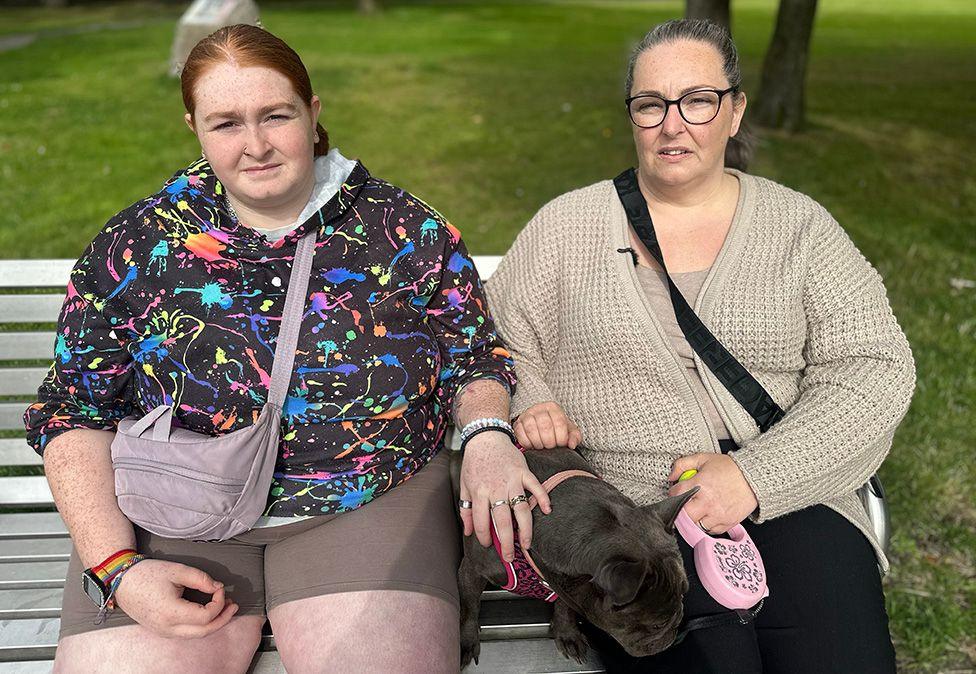Restrained and scared - the £100k schools failing vulnerable children

Leah was repeatedly restrained at her independent special school
- Published
One of Leah’s most painful memories of her former school is the time she was held down for so long by members of staff, that blood vessels burst in her face.
She says restraint was used so often on her there, that she once forced a screw into her toe as a plea for help.
Leah, who’s 18 and from the north of Scotland, is autistic and has ADHD and a learning disability.
Her family had been told that an independent special school - which charged her local council £250,000 per year for a placement - would be able to meet her complex needs.
However, although Leah initially settled at the school, she found herself being repeatedly restrained. The distress this caused led to self-harm - she shaved her hair and eyebrows and pushed Blu Tack into her ears as she tried to get out of the school.
“It was so scary,” she says. “I never felt safe.”
Leah’s is just one story from more than 50 families - along with several staff and a former headteacher - who have spoken to BBC News. They describe how children, many of whom have some of the most complex needs, are being failed by some of these schools.
A golden ticket?
Charlene says she felt she had won the golden ticket when she finally found a specialist school in the south-east of England that would meet her children’s needs.
After 40 schools had rejected her two autistic daughters, Isla, 13, and Skye, 11, she thought that, at last, this independent special school - costing the local authority £100,000 per child per year - would allow them to thrive.

Charlene says her daughters, Isla and Skye, have been failed both academically and emotionally
But a couple of years later, she says the girls are traumatised and out of education. Charlene says the school failed them both emotionally and academically.
At one stage, she says, her younger daughter was being restrained daily.
Due to a lack of provision in the state sector, and the growing number of children being identified as having special educational needs and disabilities (SEND), councils are increasingly turning to private provision.
Last year, local authorities in England spent £1.6bn on sending children to independent special schools - sometimes at more than £1m a place. The majority are privately owned and run on a profit-making basis.
The testimonies we have received represent a small snapshot, but experts have told the BBC that the issues they raise are common across the sector. They include:
An unnecessary and excessive use of restraint, and concerns that it is being used as a punishment
A lack of qualifications - parents told us how some of those teaching their children had very little or no teaching experience
Children making poor academic progress
We shared our findings with Minister for School Standards Catherine McKinnell. She told us the government wanted to reform the SEND system, a key part of which includes “tackling the over-reliance on independent special schools - not least due to the issues raised in this reporting”.
The Local Government Association - which represents councils in England and Wales - describes the SEND system as “broken”, and notes that the number of children being placed in independent special schools has more than doubled over the past decade. It is calling for “urgent reform” and long-term funding so children can be supported in the mainstream sector.
There are more than 800 independent special schools across the UK, catering for about 21,000 children. They can offer a different learning environment for children who have struggled in mainstream education, and for many, they are the only establishments that can cater for such complex needs.
But Dr Cath Lowther, the general secretary of the Association of Educational Psychologists has concerns over the quality of the services some schools are offering.
“I worked in local authorities, and I saw independent special schools who are promising the earth and then charging the same, but then not delivering.”
Charlene’s initial impression of her daughters’ school was positive but she says this changed “overnight” when a large specialist education company took over: “It felt like the environment our children thrived in, vanished.”
A huge turnover of staff followed, and Charlene says the ethos of the school completely changed.
“The escalation in the amount of restraints was huge,” she says. “Collectively as parents, we were all very alarmed about what we were seeing, because most of the children were in absolute crisis.”
Pupils mocked and put in headlocks by school staff
- Published17 June 2024
The school has told the BBC it was rated “good” in its latest Ofsted review which takes into consideration the views of parents. The report called it an “inclusive and welcoming place”. It also said the group that owns the school had “worked tirelessly to address parental concerns”.
Charlene says that in a bid to get her school and local authority to listen, she and the families of 16 other children - nearly half the school - decided to write a formal joint complaint in July 2023. They hoped there would be more power in speaking out together.
The local authority says that it instigated a quality assurance visit and a safeguarding learning review after parents raised complaints, but neither of those identified any concerns.
Many of the families the BBC has spoken to say the complaints process is so complex, and often opaque, that they feel powerless when they do raise concerns.
‘It felt like nobody was listening’
In Scotland, Leah’s mother, Samantha, also started to raise her concerns, firstly with Leah's school, then the local authority, which rejected her complaints.
“It felt like nobody was really listening to us,” she says.
With the help of a solicitor, Leah eventually launched - and won - a disability discrimination case against her school to try to stop the restraints.
The tribunal judge said the school could not show that the restraint was a “proportionate means of achieving a legitimate aim”.
After the tribunal, Leah’s local council terminated her school placement and put an alternative support plan into place for her.
Meanwhile, the school says it accepts the tribunal’s ruling and has complied with its requirements and recommendations. These included a letter of apology to Leah and making staff undergo training “to avoid and reduce the use of restraint”.

Leah, with her mother Samantha, won a disability discrimination case against her school
The council has told the BBC that it now monitors the use of restraint by care providers, and its impact on young people. It says it is awaiting further guidance on the subject from the Scottish government, who told us that independent special schools “play an important role” in providing additional support.
Teachers don't have to be qualified
The body that speaks for independent special schools in England and Wales says that for local authorities, and for many families who have children with complex needs, these establishments provide an important way of meeting demand.
"You're getting a holistic service which has been shown to make a big difference to long-term outcomes,” says Claire Dorer, CEO of the National Association of Special Schools.
“Teaching and learning is hugely important, but so too is addressing mental health concerns and addressing trauma. And you've got many independent schools which are well resourced to do that with on-site provision, generally in stark contrast to state-funded provision.”
Independent schools in the UK must be registered with the education authority in their nation and be subject to standards inspection there.
However, they do not need to employ qualified teachers (except in Scotland). We found out that in one school there were just three qualified teaching staff out of 22. A parent also told us about a school where a cook from another school had been moved and employed as a teacher.
The schools can also opt out of following the SEND code of practice and, unlike state schools, they can exclude pupils for non-disciplinary reasons.
Some families who spoke to the BBC wanted to do so anonymously because they have children who are still in school and are worried about jeopardising their places.
Meanwhile, Charlene’s attempts to raise concerns at her daughters’ school had little effect, and within the space of a year, Isla and Skye - and nine other children - had left.
For the past 18 months, the girls have struggled at home, unable to find another school that can meet their needs, and Charlene is worried about their future.
“It is bleak,” she says, “Isla should be going into year nine, starting to look at what GCSEs she wants to do and what she wants to do for her future. But she really hasn't had an education for so long now.
“It's really worrying. Where do we go from here?”